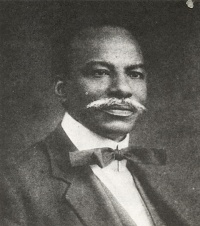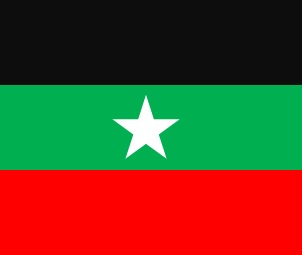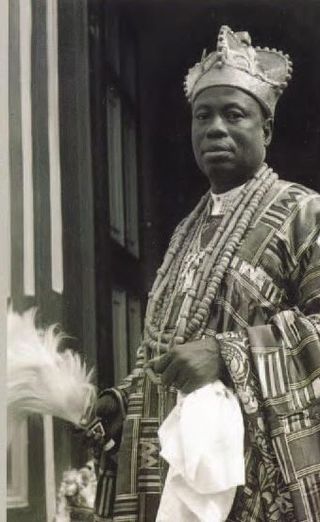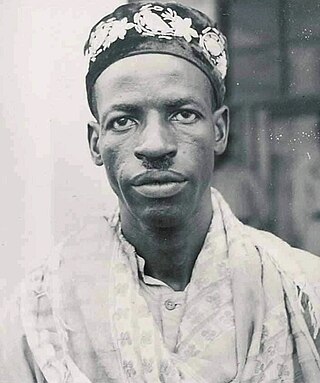Related Research Articles

Nnamdi Benjamin Azikiwe, PC, usually referred to as "Zik", was a Nigerian statesman and political leader who served as the third Governor-General of Nigeria and first president of Nigeria during the First Nigerian Republic which existed from 1963 to 1966. Considered a driving force behind the nation's independence, he came to be known as the "father of Nigerian nationalism".
The National Council of Nigeria and the Cameroons (NCNC) later changed to the National Convention of Nigerian Citizens, was a Nigerian nationalist political party from 1944 to 1966, during the period leading up to independence and immediately following independence.

Olayinka Herbert Samuel Heelas Badmus Macaulay was a Nigerian nationalist, politician, surveyor, engineer, architect, journalist, and musician and is considered by many Nigerians as the founder of Nigerian nationalism.
Michael Iheonukara Okpara was a Nigerian politician and Premier of Eastern Nigeria during the First Republic, from 1959 to 1966. At 39, he was the nation's youngest Premier. He was a strong advocate of what he called "pragmatic socialism" and believed that agricultural reform was crucial to the ultimate success of Nigeria.
Zikism is the system of political thought attributed to Nnamdi Azikiwe ("Zik"), one of the founding fathers of modern Nigeria and the first democratically elected President of Nigeria. Azikiwe expanded on this philosophy through his published works, such as Renascent Africa (1973) and his autobiography My Odyssey.

Aminu Kano was a Muslim politician from Nigeria born at Sudawa, Gwale Local Government and resided at Gwammaja, Dala Local Government. In the 1940s he led a socialist movement in the northern part of the country in opposition to British rule. The Mallam Aminu Kano International Airport, the Aminu Kano Teaching Hospital, and the Aminu Kano College of Islamic Studies all in Kano, are named after him. He was a relative to the father of former Head of State Murtala Mohammed, former Minister of Defense Inuwa Wada and former Minister of Foreign Affairs Aminu Bashir Wali.
Eyo Ita (1903–1972) was a Nigerian educationist and politician from Creek Town, in present-day Cross River State, who was the leader of the Eastern Government of Nigeria in 1951 and the first Professor Nigeria ever had. He was one of the earliest Nigerian students who studied in the United States instead of the frequent route of studying in the United Kingdom. He was a deputy national president of the National Council of Nigeria and the Cameroons (NCNC) in the late 1940s and early 1950s.
Federal Airport Authority of Nigeria (FAAN) is a service organization statutorily charged to manage all Commercial Airports in Nigeria and provide service to both passenger and cargo airlines. Generally, to create conditions for the development in the most economic and efficient manner of air transport and the services connected with it. The agency has its head office on the grounds of Nnamdi Azikiwe International Airport in Abuja, Federal Capital Territory.
Kofoworola Adekunle "Kofo" Abayomi was a Nigerian ophthalmologist and politician. He was one of the founders of the nationalist Nigerian Youth Movement in 1934 and went on to have a distinguished public service career. His last major public assignment was as chairman of the Lagos Executive Development Board from 1958 until 1966.
The West African Pilot was a newspaper launched in Nigeria by Nnamdi Azikiwe ("Zik") in 1937, dedicated to fighting for independence from British colonial rule. It is most known for introducing popular journalism within Nigeria. The main focus of the newspaper was to promote Nigerian independence from colonial rule. Football was a topic often used within the media to promote these various arguments of independence. With humanistic language and powerful ideas, the West African Pilot successfully promoted the humanity of African workers in this colonized world. The newspaper dismissed the idea that sports and politics are to be separated, further supporting African's connection to the game and adding specific cultural impact to the game itself; this supported a new kind of identity pertinent to the Nigerian people. Through fictional stories and football centered symbolism, the newspaper was even said to have, "created the possibility of a new form of imagined community", setting the stage for how a modern society should be.

Nigerian nationalism asserts that Nigerians as a nation should promote the cultural unity of Nigerians. Nigerian nationalism is territorial nationalism and emphasizes a cultural connection of the people to the land, particularly the Niger and the Benue Rivers. It first emerged in the 1920s under the influence of Herbert Macaulay, who is considered to be the founder of Nigerian nationalism. It was founded because of the belief in the necessity for the people living in the British colony of Nigeria of multiple backgrounds to unite as one people to be able to resist colonialism. The people of Nigeria came together as they recognized the discrepancies of British policy. "The problem of ethnic nationalism in Nigeria came with the advent of colonialism. This happened when disparate, autonomous, heterogeneous and sub-national groups were merged to form a nation. Again, the colonialists created structural imbalances within the nation in terms of socio-economic projects, social development and establishment of administrative centres. This imbalance deepened the antipathies between the various ethnic nationalities in Nigeria ." The Nigerian nationalists' goal of achieving an independent sovereign state of Nigeria was achieved in 1960 when Nigeria declared its independence and British colonial rule ended. Nigeria's government has sought to unify the various peoples and regions of Nigeria since the country's independence in 1960.

The Northern Elements Progressive Union (NEPU) was the first political party in Northern Nigeria. Founded in Kano on 8 August 1950, it was the offshoot of a pre-existing political association called the Northern Elements Progressive Association. It became the main opposition party in Northern Nigeria after the region was granted self-governance in the 1950s. In the First Republic it maintained a steady alliance with Zikist National Council of Nigeria and the Cameroons (NCNC) against the Northern People's Congress (NPC)-dominated Federal Government.
Michael Athokhamien Omnibus Imoudu was a Nigerian labour union leader.

Oba Sir Musendiku Buraimoh Adeniji Adele II, KBE was the Oba (King) of Lagos from 1 October 1949 to 12 July 1964.
Abubakar Ibiyinka Olorun-Nimbe (1908–1975) was a Nigerian medical doctor and politician who was the first and only Mayor of Lagos. He represented Lagos in the Legislative Council.
Oliver Ogedengbe Macaulay, alias Oged Macaulay was a Nigerian politician, archivist, journalist, public relations consultant, and private secretary to Oba Adeyinka Oyekan. He was the son of Herbert Macaulay.

Mazi Mbonu Ojike was a Nigerian nationalist and writer. He advanced from a choirmaster, organist, and teacher in an Anglican school to become a student in America and then a cultural and economic nationalist. He was the Second Vice President NCNC and Deputy Mayor of Lagos in 1951. Ojike was known as the "boycott king" for his slogan, 'boycott the boycottables'. In America, he spent 8 years involved in intellectual pursuit and improving outsiders’ knowledge of Africa speaking from an African perspective. Upon his return, he promoted his brand of Africanisation, a persistent consumption of African forms of cloths, food, dress, religion and dances while also believing in the selective benefits of foreign amenities. Ojike made common the use of the word Mazi as a substitute for Mr.
Osita Agwuna was a Nigerian activist who was deputy president of the Zikist Movement in 1947. He was among a group of young Zikist members who expressed militant criticism of colonial rule and urged concerted action to overcome colonialism. Agwuna later became known as the Eze of Enugu Ukwu, serving the town in that position for 5 decades.
Michael Oguejiofo Ajegbo was a Nigerian lawyer and politician who was Attorney-General of Nigeria's Eastern Region during Nigeria's First Republic.

Sa'adu Zungur was a Nigerian revolutionary, poet, jurist and nationalist who played an important role in Nigeria's independence movement particularly in Northern Nigeria. He is generally regarded as the father of 'radical politics' in Northern Nigeria. Zungur's political writings criticising the colonial government of Northern Nigeria, especially the emirate system, helped in laying the foundation for the principle of self-determination in Nigeria. His literary and political endeavors influenced a number of the leaders of the independence movement in Northern Nigeria, notably Aminu Kano and Isa Wali.
References
- 1 2 3 4 5 Suberu, Abdulrahman. "HABIB RAJI ABDALLAH, 1920 - 1982: AN UNCOMMON NATIONALIST FORGOTTEN IN THE SANDS OF HISTORY". journal-ijah.org. Retrieved 2019-01-17.
- ↑ Dudley, B. J. (2013-11-05). Parties and Politics in Northern Nigeria. Routledge. pp. 75, 130. ISBN 9781136961892.